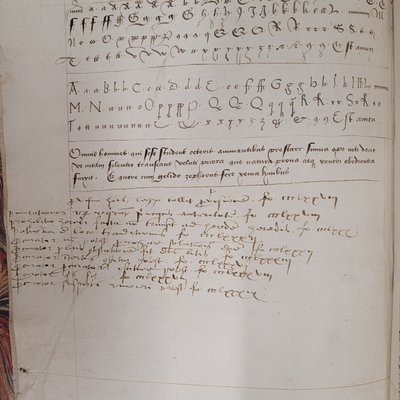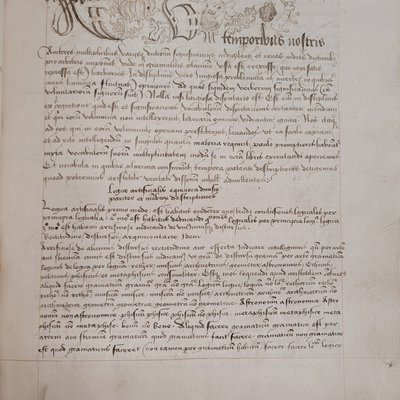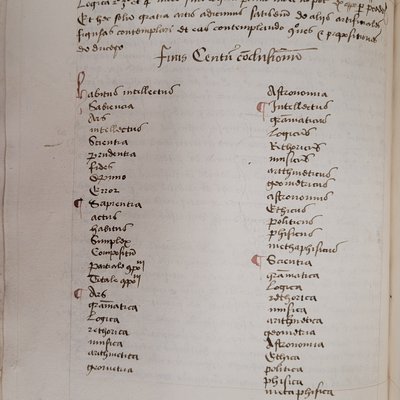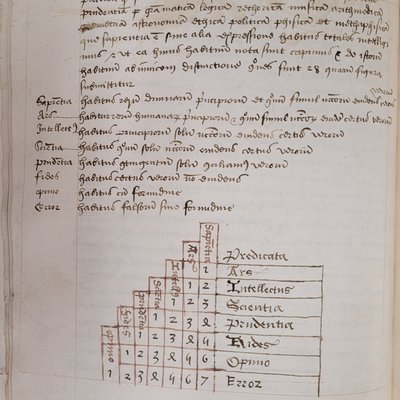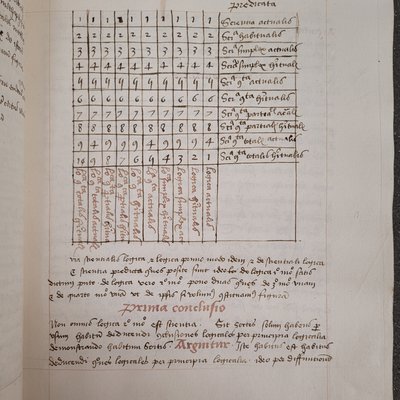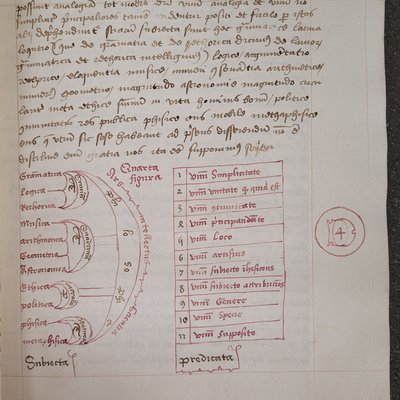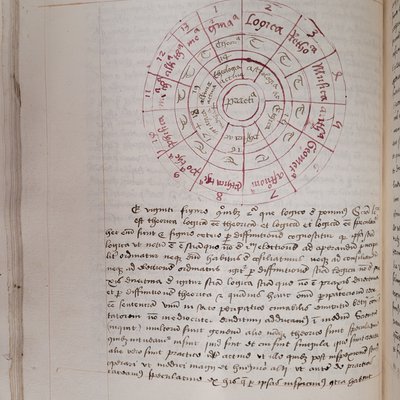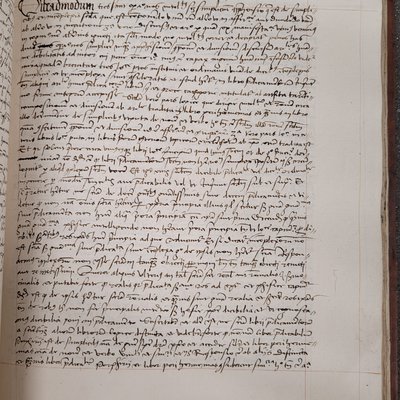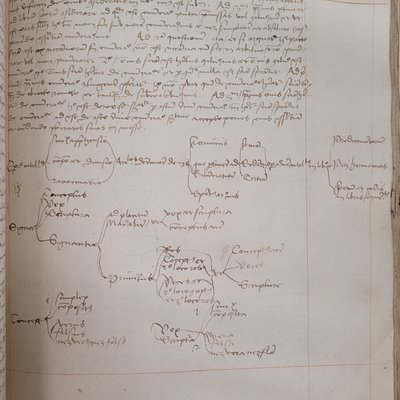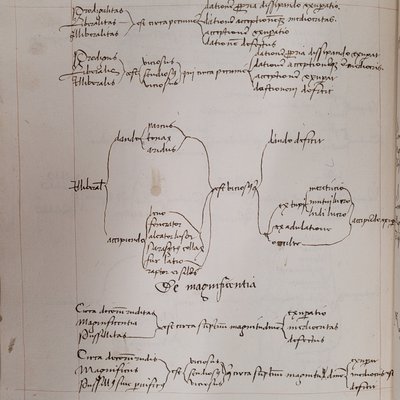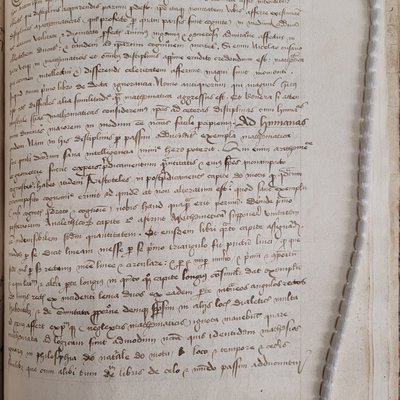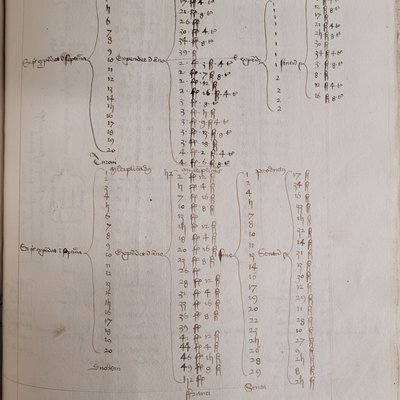October 2022
As we welcome our students for a new academic year at St John’s College, let’s have a look at a student notebook written over 500 years ago, probably at the Sorbonne in Paris. The Englishman Thomas Paynell is believed to have studied there around 1507 and he made notes into the volume that is now our MS 80.
The notebook originally started with an elaborate capital with flowers, animals, and monsters. Other than this capital, the notebook is virtually undecorated. Several texts are on logic, most of which are either unidentified or not unquestionably identified, together with two texts on Aristotle. Charts, tables, or diagrams often follow the texts. In addition, there are notes of a lecture given on mathematical subject matter by Magister Reginald Lenyus. Lenyus is otherwise known only for a commentary on Aristotle’s Philosophia naturalis (dated 1507/08 and appearing in Bordeaux, Bibliothèque de la Ville, MS 428). These mathematical lecture notes are followed by multiplication tables and other mathematical materials. Finally, there is one unidentified legal text and, interspersed throughout the volume, an alphabetical index of canon law topics. The index was probably added at a later point just as some other material on the front fly-leaves.
This nicely bound volume in a contemporary brown leather binding is full of unresolved questions, starting with the identification of those unknown texts. Even the front flyleaves, which are easy to overlook, present us with a mystery. Later added material shows two sets of letters of the Latin alphabet followed by two sentences in Latin, namely a quote of the opening sentence in Sallust’s Bellum Catilinae and a so-called pangram, a sentence using all letters of the alphabet at least once (‘Equore cum gelido zepherus fert exinia kymbus’). This pangram is a sentence commonly used when learning to write and it appears in a number of medieval manuscripts. Moreover, it is recommended for practicing the Latin alphabet in John Brinsley’s Ludus literarius, or, The Grammar Schoole (1612), which as in turn based on the work of the Elizabeth I’s tutor Roger Asham. If Ralph Hanna is correct in ascribing all writings in our MS 80 to the volume’s donor Thomas Paynell, then why would he make notes on how to learn how to write? Is this just a pen trial as they often appear in medieval manuscripts? Has the student progressed to teacher?
Another mystery is the identification of Thomas Paynell. More than one Thomas Paynell lived at the right time to qualify as the donor of this volume and, indeed, a host of early printed books, which constitute the first large influx of printed books to the early library of St John’s College. Our Thomas Paynell is generally identified as a translator from an old Lincolnshire family, who died around 1564 and who had made his will dated 10 March 1559, which records the donation of books to St John’s College. Before the Dissolution of the Monasteries, Paynell had been a canon of Merton Priory (Surrey). In 1540 he became rector of Cottingham (Yorkshire) and in 1545 rector of All Hallows, Honey Lane, London. It appears that he had some experience with diplomatic missions, as he is believed to be the Thomas Paynell ‘who accompanied Christopher Mount on a mission directed by Thomas Cromwell to the protestant princes of Germany’ (Eatough). Paynell was also chaplain to Henry VIII and orator to Mary I and Elizabeth I. Indeed, he seems to have braved the choppy waters of the religious back-and-forth of Tudor England quite successfully. His translations include the works of Erasmus of Rotterdam, Thomas More, and, in a manuscript now in Salisbury, Martin Luther. The printed books and early modern manuscripts Paynell donated to St John’s College do not, unfortunately, shed any light on his work as a translator. Is this just a coincidence or is there scope for re-opening the question who our Thomas Paynell really was?
Interested in medieval mathematics?
Check out Professor Paul Tod’s blog post on multiplication tables in our early 12th century Thorney Computus (MS 17) at https://stjohnscollegelibraryoxford.org/2019/11/19/impulse-of-delight-paul-tod-on-ms17/
References:
Eatough, Geoffrey, ‘Thomas Paynell (d. 1564?)’, Oxford Dictionary of National Biography (2004), at https://doi.org/10.1093/ref:odnb/21661 [accessed 28/09/2022] (All information about Thomas Paynell is taken from Eatough)
Hanna, Ralph, A Descriptive Catalogue of the Western Medieval Manuscripts of St John’s College Oxford (Oxford: Oxford University Press, 2002)
